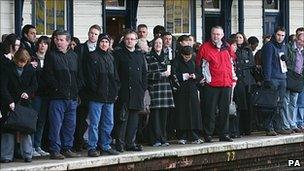Hansard Society survey: One in ten plan voluntary work
- Published

People are more likely to get involved locally if an issue directly affects them, the poll suggests
Most people in Britain are unwilling to get involved in their community despite wanting to engage more with local issues, research suggests.
Only one in ten definitely intended to do voluntary work in the next two years, Hansard Society's post-general election poll of 1,200 people found.
The government's flagship Big Society policy seeks to increase volunteering.
The Hansard Society says its findings suggests the Big Society must avoid "political associations" to succeed.
Prime Minister David Cameron has described his flagship idea, which seeks to mobilise community-led initiatives in a range of areas, as his "mission".
The Hansard Society's findings come from its annual Audit of Political Engagement, for which nearly 1,200 people in England, Scotland and Wales were interviewed.
The organisation, which seeks to encourage public involvement in politics, found that interest in politics and knowledge of political events had both increased since last May - 58% of people claimed to be interested in politics, a 5% rise since last year, while 44% claimed to be "knowledgeable" about politics, a 7% increase.
However, this was not matched by an increase in political engagement beyond voting.
While 69% of people said they were interested in how things worked in their local area and 51% felt getting involved could make a difference, only one in 10 said they were certain to do so in the next two years.
'Not roused'
Those most likely to put themselves forward were parents aged under 45 and from a high-income group. People were more likely to volunteer if they felt strongly about an issue and believed it was directly relevant to them.
However, the research found that while 14% of people were active at a community level and a further 14% were willing to be active, 35% described themselves as either unenthusiastic or preferring to remain as onlookers.
A further 26% classified themselves as "apathetic" or "alienated" from the political process.
"The momentous events surrounding the election and its aftermath have left people feeling more interested in and knowledgeable about politics," Dr Ruth Fox, director of the Hansard Society's parliament and government programme, said.
"But they have not been roused to get more involved in it - the majority prefer to remain spectators.
"People say they are interested in being more engaged locally but, on the whole, are not willing to actually commit to activities. They are not very altruistic. It is self-interest that motivates them to action - when an issue affects them or their community in a personal way."
While the research suggests people think volunteering can have more impact locally than nationally, people are generally less aware of what is happening on their doorstep than they are about national issues and controversies.
Dr Fox said: "A clear focus on the local and personal is where the Big Society has the biggest chance of succeeding. The concept needs to avoid political associations, focus on the local and personal and emphasise community rather than society."
The government says the Big Society is not just about volunteering it is about giving communities more power, and says that it is providing funding to train community organisers to act as "catalysts for social action" and is establishing a voluntary "citizens service" for young people.
Minister for Volunteering Nick Hurd told the BBC: "I hear this voice that says: 'It's not worth getting involved because it's not as if we can change anything', that's what we're trying to tackle.
"Everything we're doing is trying to change what's possible to achieve at a local level so people feel more motivated to give time, to come together, to work with others to try and find new ways of doing things or improving things in a local area."
The survey also found that just over one in four people were happy with what Parliament was doing - a 6% fall on the year before - while less than one in three agreed that Parliament was "working for you and me" - a decline of 8%.
Polling firm Ipsos Mori conducted the interviews on behalf of the Hansard Society - which were then extrapolated on the basis of the profile of the population of Great Britain. No interviews were conducted in Northern Ireland.
- Published14 February 2011
- Published3 February 2011
- Published30 December 2010
- Published16 June 2010